A CONVERSATION WITH EMELIE MAHDAVIAN (MIDNIGHT TRAVELER)
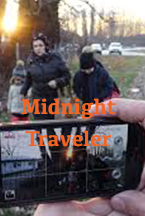 I met with producer/writer/editor, and UC Davis professor, Emelie Mahdavian at the Sundance Film Festival on Sunday, January 27, 2019, to discuss her collaboration with director Hassan Fazili on his new documentary Midnight Traveler (which I also reviewed). He and his family are currently unable to travel outside Germany, where they are seeking asylum. The film chronicles, in direct, harrowing, first-person accounts, their journey from Afghanistan to Europe, fleeing their native country after the Taliban puts a price on Fazili’s head. Shot with three different iPhones, by the father, his wife Fatima (also a filmmaker), as well as daughters Nargis (the eldest) and Zahra, Midnight Traveler offers us a visceral vicarious experience as we follow along on what at best is an unsettling – at worst, terrifying – odyssey. As the editor, Mahdavian deserves a great deal of credit for shaping the story from material gathered over multiple years. Here is a condensed digest of our conversation, edited for length and clarity.
I met with producer/writer/editor, and UC Davis professor, Emelie Mahdavian at the Sundance Film Festival on Sunday, January 27, 2019, to discuss her collaboration with director Hassan Fazili on his new documentary Midnight Traveler (which I also reviewed). He and his family are currently unable to travel outside Germany, where they are seeking asylum. The film chronicles, in direct, harrowing, first-person accounts, their journey from Afghanistan to Europe, fleeing their native country after the Taliban puts a price on Fazili’s head. Shot with three different iPhones, by the father, his wife Fatima (also a filmmaker), as well as daughters Nargis (the eldest) and Zahra, Midnight Traveler offers us a visceral vicarious experience as we follow along on what at best is an unsettling – at worst, terrifying – odyssey. As the editor, Mahdavian deserves a great deal of credit for shaping the story from material gathered over multiple years. Here is a condensed digest of our conversation, edited for length and clarity.
HtN: How did you first meet Hassan Fazili?
Emelie Mahdavian: So, I was the director of the Davis Feminist Film Festival for a little bit, and I programmed one of his shorts in it, a film called Mr. Fazili’s Wife. Also, we had a mutual friend. In addition, I actually programmed one of his student’s films. So we got in contact, because of this mutual friend, and we were talking about projects that they were thinking about developing in Afghanistan. This was around the time that they started having problems with their visa in Tajikistan. So I started trying to help them, and then this film sort of began to happen right around that time. We agreed that we would start documenting what was happening, without knowing what it would become.
HtN: And you, yourself, are a Persian speaker.
EM: Yes.
HtN: How did you come by that interest?
EM: I came by it, basically, by accident. I started teaching myself Persian. And then I ended up making my first film also in Persian. My first documentary is in the Persian language. And then I did one of my Ph.D. exams in Persian literature. And now I’m also, incidentally, married to an Iranian, so I use it all the time.
HtN: Hassan Fazili and his family are from Afghanistan.
EM: Yes.
HtN: So Persian is one of the many languages spoken in Afghanistan?
EM: Yes. Persian includes Farsi, Dari and Tajik which are languages in Iran, Afghanistan and Tajikistan.
HtN: Got it. Can you describe your role in the film?
EM: So the film was a collaboration between the two of us from the beginning, and we divided things up in a way that made sense. I was helping, arranging contacts to get the footage from them, to get it safe, and get it sent to me. And so I was actually cutting simultaneously to them shooting. Because there was so much material, and also we knew it was timely. We thought, “This needs to get out there into the world.” So I would be cutting and sending him things to
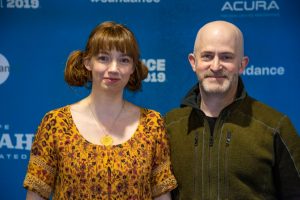
Filmmaker Emelie Mahdavian and our Chris Reed
watch. And he had just his mobile phone. They couldn’t travel with a laptop even. And so he would watch things, and we would talk about them. And then in October 2017, they were in Serbia at that point. And it was clear that they would be there awhile. So we spent a month together in Serbia working on what was at that point the first assembly.
HtN: And for the process of editing, since you were mostly in two different locations, what kind of system did you use for exchanging cuts and footage? I mean, that’s complicated, but it’s certainly possible in our modern world to communicate that way through the Cloud or other such means.
EM: Most of the sending of footage happened actually just by people who transferred it onto a drive and sent it to me, except in Hungary, where at the end of the film they were held in a camp where they couldn’t leave. And so in that case, what we did was we had a contact in Serbia top up their Serbian SIM card, which had service since they were on the border. And they actually did send out all the footage, just through their mobile internet, using apps that wouldn’t compress it, and got it to me that way. And then in terms of getting the cuts, I would upload compressed versions that I could send him the link to privately, and he would watch them.
HtN: And what did you cut on?
EM: On Premiere.
HtN: So, from your perspective, what did the status of refugees seem like in Serbia? Because in the film it seems like it’s a little better than in Bulgaria…
EM: Yeah.
HtN: …where things turn nasty. How did it seem?
EM: That’s actually true. In Bulgaria, you see in the film that they have a really terrible experience. Obviously, there were some Bulgarians who were very nice to them, as well. But there was a lot of anti-refugee sentiment. Serbia went through, as we all know, the Balkan Civil War. Many Serbians, or people who live in Serbia today, are themselves refugees of that war. There’s also a relatively large Muslim minority population. So there’s less fear of Muslims. There was definitely this big backlog in Serbia, just tons of people that were stuck there, but even though they were stuck there for a very long time, and that in itself was difficult – and it’s not a wealthy country and doesn’t have a ton of resources to provide – I think they always felt safe. And the people in Serbia were very nice to them, in comparison. So I think, in the end, they had the most positive impression of Serbia, actually.
HtN: There’s a wonderful, lyrical scene with the snow falling, and everyone playing in snow, which would certainly give the impression that they’re enjoying themselves, relatively speaking.
EM: Yeah. And I mean, it was years of their lives. They’re not going to be just dour and depressed the whole time.
HtN: Right. You know they make the most of it wherever they are.
EM: Yes.
HtN: So, I love the multiple montages. Frequently you have these many sequences with quick, short cuts throughout the film that evoke so well the emotions of the characters at different times. Whose idea were those?
EM: They were my idea. It’s my love of the montage. But it was something that I brought up with him at the beginning, because I felt as if a big part of what was strong about what they were doing, was that it was very much a first-person film. You knew you were with them. You knew you were in their experience. And we wanted to embrace that. We wanted to embrace what the mobile phone footage was. Right? I didn’t use establishing shots to encapsulate where they were. But I felt like it would be nice to have a little bit of a break. And do something to evoke their subjective space, even a little bit more. And we knew that there was a little bit also of backstory that we wanted to tell. So, he agreed.
And because I’d been there from the beginning, we were very close, and we talked all the time. So I had a pretty good sense of what their emotional journey had been like. So we worked through those together. And some of them have voiceover, some of them don’t. They each have their own character. And I think in the end the idea was to try to get at something that couldn’t have been captured just through the immediate documentation of their daily life, but which was a very real part of what the experience feels like. Right? All the memory and the regret and the fear and the hope, and all of those things that flood you maybe when you’re not shooting, or who knows.
HtN: Speaking of the editing of the film, there’s a sequence that I really enjoyed, as well, where Hassan describes his friendship with Hussain Hushaimi and keeps on using the word “cut” to flash-forward within the story. What came first there in a sequence like that? Was it his description, and you matched editing to that?
EM: Yes, it was actually how he told it, which I think is indicative of what it’s like to be a filmmaker experiencing the world. He constantly had his phone
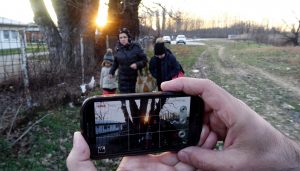
A shot from MIDNIGHT TRAVELER
on. Even when he went to tell me the story of this guy, he told it like a filmmaker. And he kept saying, “cut, cut.” And he would jump forward in time, say “cut”, and jump again. And I thought it was indicative of how he thinks about life. So I kept it, but I matched the cuts to what he was saying.
HtN: I am also curious about the relationship, in the film, of the voiceovers to the footage. Were they just recorded by Hassan and his daughter Nargis during their process of migration, or afterwards when you already had mostly finished the film?
EM: They were recorded when I was in Serbia.
HtN: All of it?
EM: Yes, but then we re-recorded some of them later, in order to get better footage. But some of them are the originals. So there’s one – I don’t want to give it away – but there’s one story that happened over black. That is the only time he told it. And that was the original recording from Serbia. But in terms of the capturing what they were feeling and thinking, they said it in Serbia, and then it wasn’t always the best sound quality, so we re-recorded it.
HtN: Such as the opening voiceover by Nargis where she’s describing hell?
EM: Yes.
HtN: Because some of it felt like it might have been added later, once you had a sense of what the film was about.
EM: Yeah, it was in a sense, because Serbia was already partway along. When we got close to the very end here, Su [Kim], the other producer, arranged for me, our sound designer, our composer, my co-editor, and her to all go to Germany, because Fazili can’t travel. So we set up like a mobile sound-edit suite in an Airbnb there, and Fazili came to us, as did the whole family. And so we picture-locked together and did the sound design and the compositions. So when I say that some of it was re-recorded, the parts that were re-recorded were done then.
HtN: Understood.
EM: I guess what I mean to emphasize is just that it wasn’t something that we wrote after the fact to fix story problems. It fits the documentation of things that they had thought at those moments, that we then cleaned up.
HtN: It didn’t feel to me like you were fixing story problems. I was just curious as to what came first. I also really like your inclusion of so many domestic moments, like the argument over Hassan talking to other women. I really liked the richness of the husband/wife relationship. Were there any moments that maybe you wanted to include in the film, that Hassan didn’t? He seemed, and his wife Fatima seemed, very open to basically anything. But were there any moments that didn’t make it into the final version?
EM: No, it was usually the other way around. I was the editor trying to take things out. And like you saw, whatever I had in the footage they were fine with me using. And they never said, for instance, “You can’t show that fight between us.” Never once. There was no conversation about it. I think they knew that what they were documenting, whatever they shot, could get used. But maybe there were some things that happened that they didn’t want to shoot and they didn’t give it to me. But I never had to fight with them about anything like that. They are very open, and I think they were very brave about being open in that way.
HtN: And they’re both filmmakers.
EM: Exactly. But they don’t always agree, which is kind of what’s great about it. Because you see that.
HtN: Right. But that’s part of a healthy relationship, if you can disagree and that’s OK. So where are they now, and how are they doing?
EM: They’re in Germany. They’re doing OK. Nargis is in school, which is great. They’re still living in a camp. They unfortunately had to restart their asylum claim from scratch, so they’re really at stage one as of this month.
HtN: Why so?
EM: The first attorney that they got never filed their paperwork with the courts. Some of our film funders then helped us to get them a better attorney, and we found out that this kind of terrible mistake, or whatever it was, happened. So, they’re restarting it. It just means that they’re many months behind, because they actually arrived in Germany last April. So we believe they have a strong case, but we don’t know how it’s going to turn out at this point. And there’s always the Dublin Convention to fight.
HtN: What’s the Dublin Convention?
EM: The Dublin Convention is a rule in Europe that says that whatever your first point of entry inside of the Schengen Zone of the EU is, whatever country that is, that’s where you have to stay permanently and apply for asylum. And their first one was Hungary. But because they documented the conditions inside that, basically that prison that they were in, which the Hungarian government insists is not a prison, they don’t feel that they would be safe now that the film is released. So they’re trying to stay in Germany.
HtN: Wow. And Hassan couldn’t make it to Sundance because of visa issues?
EM: No, actually he doesn’t have a passport. They don’t have passports.
HtN: Oh, right, of course.
EM: And they’re not allowed to travel at this stage in their asylum process. So they haven’t even applied for a visa, because they don’t have the necessary materials. But we are going to be at the Berlinale next, and they will be able to come to that.
HtN: That’s great! That’s really good to hear. Well, congratulations on the film. It’s really quite beautiful.
EM: Thank you. I’m glad you watched it and enjoyed it.
– Christopher Llewellyn Reed (@ChrisReedFilm)
Like what you see here on Hammer to Nail? Why not pay just $1.00 per month via Patreon to help keep us going?








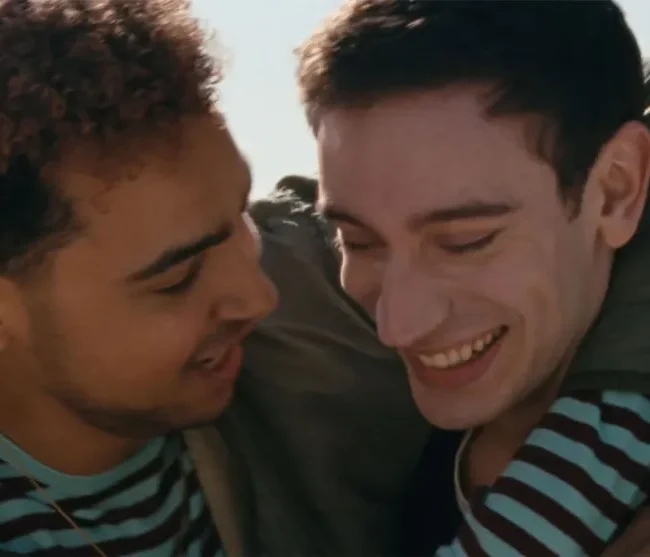
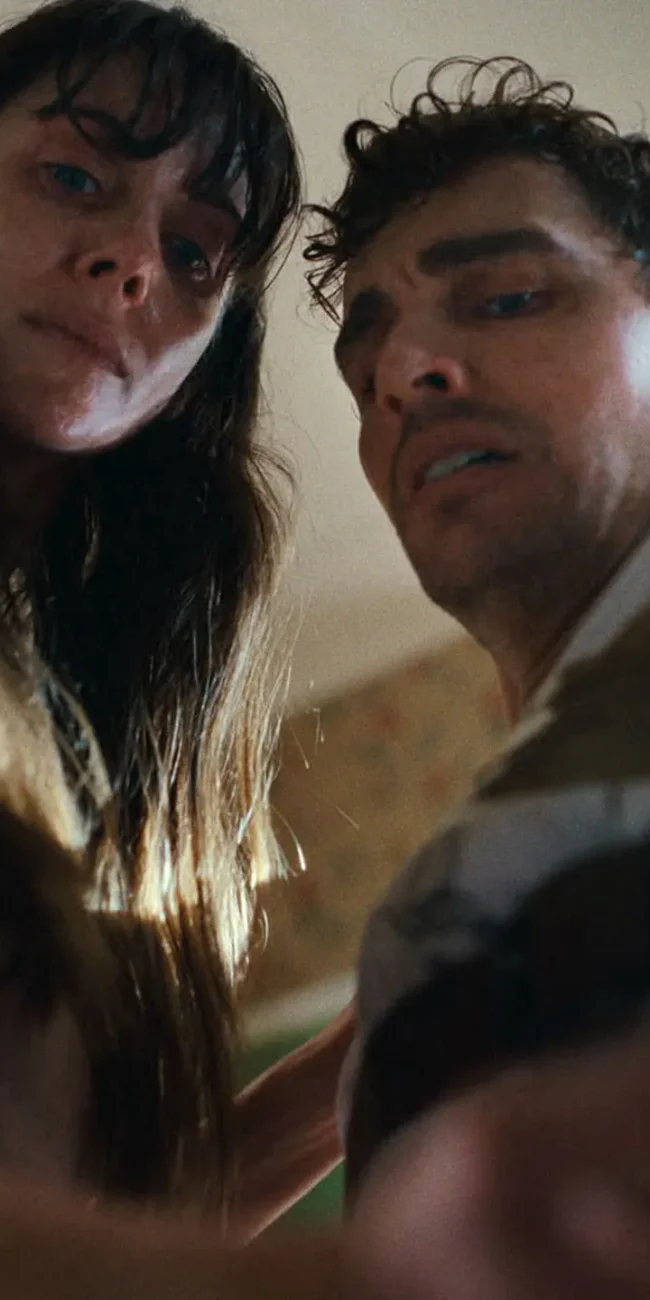


Jovanka Vukosavljevic
I watched this film from beginning to end it made me cry and laugh at the resilience of the human
spirit and heart. I pray that Germany gives them that asylum and home away from home they are look
looking for. I too came with my family from Serbia 50 years or so when I was a kid.
Christopher Reed
Hi, Jovanka! Thanks for reading the interview. Glad it spoke to you!